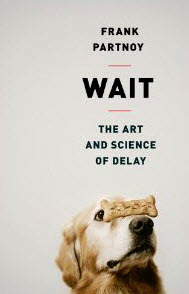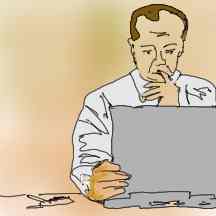Source of article Jury Insights.
When Delay Is Good
Frank Partnoy, Professor of Law and Finance and director of the Center on Corporate and Securities Law at the University of San Diego, is a frequent commentator on CNBC and other business channels.
His most recent book is WAIT: The Art and Science of Delay was published in June 2012, and is about the virtue of delaying decision-making in many situations.
 Media teasers promoting this book mischaracterize Professor Partnoy as arguing that “procrastination” is a good thing.
Media teasers promoting this book mischaracterize Professor Partnoy as arguing that “procrastination” is a good thing.
Partly, this misinterpretation results from Partnoy wanting to appear as a contrarian to the notion that “he who hesitates is lost.”
Actually, Partnoy is advancing a somewhat common sense notion that professionals (at almost anything) strategically gather information to the last possible moment before making irreversible decisions. In other words, Partnoy is picking up the “good things come to those who wait” side of the argument.
The point is that there is a right timing for everything, and that there is often a virtue to waiting to obtain more information before committing.
Partnoy informs us that a study of surgeons who delayed their work by one minute lowered deaths by 50 percent. Well, yes, I would like my surgeon to stop and think for a minute before jumping in.
Successful Behavior and Anxiety Management
Successful behavior in life often depends on how we manage anxiety. Anxiety can work as an effective warning light, but may also trigger impulsive “acting out,” or conversely paralyze taking action.
The itch of healthy anxiety…
Recognizing a desire to hold back from acting may reflect the itch of healthy anxiety. This type of anxiety can be a positive, allowing us to integrate delay into part of the strategic decision-making process. We should pay attention to that internal sense of not being sure we want to do things– take on a particular case, invest in precious metals, go skydiving, or give unasked for advice– that feeling that tells us to avoid impulsive action.
Procrastination may reflect avoidance caused by anxiety…
Procrastination, putting off until tomorrow what you can do today, may reflect behavioral paralysis caused by anxiety. The avoidance of dealing with the inevitable is not a particularly useful decision-making strategy. Not returning phone calls, running from conflict, or missing deadlines, may be indicators of avoidant behavior.
Make decisions when the cost of new information does not justify the knowledge gain…
The reality is that it is difficult to predict the outcome of a decision with certainty. That’s life. We either decide, or time will run out and the decision will be made for us.
It is important to note the point at which additional information is no longer worth the time or the expense of the potential knowledge gain.
As a metaphor, I think of all those games in the March Madness NCAA basketball tournament in which the outcome comes down to one last shot. A point guard has the ball and is scanning for an open teammate with a better opportunity than his/her own to score. The player weighs the cost-benefit of waiting an additional second. Indecisiveness will result in losing the game.
Litigation is all about strategic timing…

In litigation, the attorney works with a never-ending stream of details and deadlines requiring strategic timeline decision-making. Is now better? Or would later be better?
When is the best time to file (almost anything)?
When is the best order to apply to taking several depositions?
When is it advantageous to strategically continue litigation down the road?
When is the best time to conduct mock juror research?
When is the best time to prepare a witness for testimony?
Partnoy offers the advice that strategic decision-timing is a three step process:
1) Figure out how long you have to make the decision
2) Think about the decision as long as possible
3) Act decisively at the last possible moment
In short, don’t go to press too early; you might miss the late breaking news.
